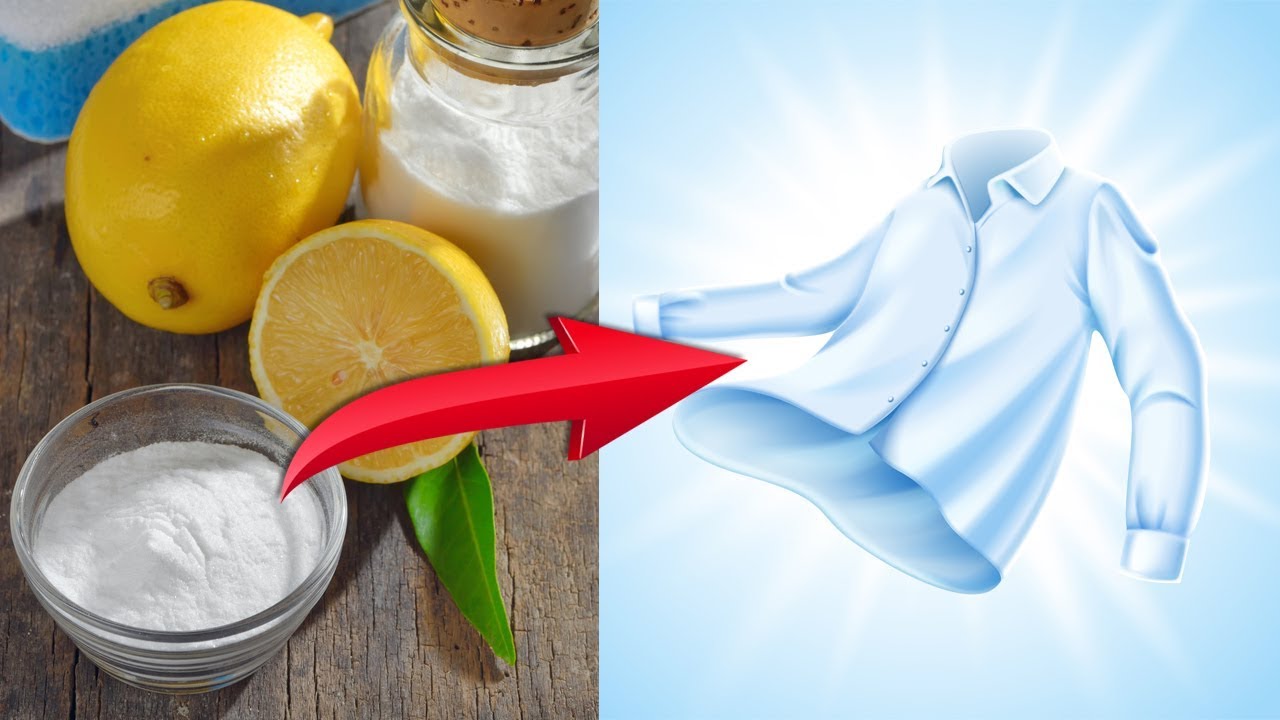6 Natural Ways to Remove Odors and Stains from Clothes
Washing clothes should be a very simple task, but it can also be quite difficult—especially when you are dealing with stains or odors that are hard to get out.
Clothes that have been stored for long periods of time or that are exposed to sweat tend to absorb unpleasant odors that don’t come out during a normal wash cycle.
Furthermore, if there is mold in our closets or if our clothes have been in smelly environments, oftentimes we have to throw away our favorite clothes.
Thankfully, there are several natural ingredients that help neutralize these odors without affecting the quality of our clothes.
Here are six tricks based on natural ingredients that will help you get the smell of sweat out of your clothes without ruining them and help you save money on fabric softeners:
1. White wine vinegar for unpleasant odors
Lots of people recommend using white wine vinegar to clean your house, and it is also a great alternative to wash your clothes.
The acids help eliminate dirt and food stains and remove bad smells.
Furthermore, white wine vinegar has a softening effect and makes all fabrics have a very nice feel.
Just pour half a cup of white wine vinegar in your washing machine, where you would normally pour the fabric softener.
If the odors are very strong, mix the vinegar with some water and soak your clothes in it for about 20 minutes.
2. Cold air
The cold air of the refrigerator is a good solution to remove moldy smells that linger on some clothes.
How do you use cold air to get the smell of sweat out of clothes?
Wash you clothes like normal and then leave them in the refrigerator for a few hours.
After a few hours rinse them out and hang them outside to dry.
3. Baking soda
Baking soda is one of the most widely known natural ingredients that can be used to clean with.
Not only does it help remove substances that cause unpleasant odors, but it also gets out stains.
Because of its bleaching effects, it removes sweat stains and should only be used on white clothing.
How do you get the smell of sweat out with baking soda?
Just shake it on your clothes and let it sit for 20 minutes, then remove it using a brush.
To avoid mold, put a small quantity of baking soda in your closet.
4. Tea tree oil
Tea tree essential oil contains antibacterial and anti-fungal substances that are often used to treat health problems.
It’s used to neutralize odors since it eliminates the humidity from the clothes.
How do you use tea tree oil?
Mix the tea tree oil with water and apply it on your clothes.
Place the clothes outside and let them sit for an hour.
5. Lemon juice
Fresh lemon juice is frequently used to eliminate sweat stains and smells since its citric acid can easily penetrate the fabrics.
How do you get the smell of sweat out of clothes using lemon juice?
Juice several lemons and mix the juice with 2 liters of warm water. Let it cool for a while then soak the clothes in it for 30 to 40 minutes.
When they have finished soaking, rinse them out and hang them outside to dry.
6. Orange peel
An orange peel’s smell is pleasant and helps neutralize bad odors.
Furthermore, its components leave clothes feeling soft and help remove dirt stains.
Peel several oranges and boil the peel in 2 liters of water. Let it cool for a while then soak your clothes in it.
After they have been soaking for three hours, rinse out the clothes and hang them outside to dry.
Now that you’ve learned to remove odors from your clothes with natural ingredients, and have seen that the ingredients are very easy to use, all you have to do is choose the method that best fits your daily routine.
For more information and references, check the article on our blog:
https://www.naturalcures.me
Disclaimer: The materials and the information contained on Natural Cures channel are provided for general and educational purposes only and do not constitute any legal, medical or other professional advice on any subject matter. These statements have not been evaluated by the FDA and are not intended to diagnose, treat or cure any disease. Always seek the advice of your physician or other qualified health provider prior to starting any new diet or treatment and with any questions you may have regarding a medical condition. If you have or suspect that you have a medical problem, promptly contact your health care provider.



![[ID: Hx_A0iLhdr8] Youtube Automatic](https://bizimtube.com/wp-content/uploads/2021/03/id-hxa0ilhdr8-youtube-automatic-236x133.jpg)
![[ID: lp7w0UmpuIs] Youtube Automatic](https://bizimtube.com/wp-content/uploads/2021/03/id-lp7w0umpuis-youtube-automatic-236x133.jpg)
![[ID: s2-7T1TH-lY] Youtube Automatic](https://bizimtube.com/wp-content/uploads/2021/03/id-s2-7t1th-ly-youtube-automatic-236x133.jpg)
![[ID: b_lakC9M4UQ] Youtube Automatic](https://bizimtube.com/wp-content/uploads/2021/03/id-blakc9m4uq-youtube-automatic-236x133.jpg)
![[ID: r44yl6nPONs] Youtube Automatic](https://bizimtube.com/wp-content/uploads/2021/03/id-r44yl6npons-youtube-automatic-236x133.jpg)
![[ID: pAwto1YQjA8] Youtube Automatic](https://bizimtube.com/wp-content/uploads/2021/03/id-pawto1yqja8-youtube-automatic-236x133.jpg)
![[ID: XETG8azHiv4] Youtube Automatic](https://bizimtube.com/wp-content/uploads/2021/03/id-xetg8azhiv4-youtube-automatic-236x133.jpg)
![[ID: f3G_-S_2HUk] Youtube Automatic](https://bizimtube.com/wp-content/uploads/2021/03/id-f3g-s2huk-youtube-automatic-236x133.jpg)
![[ID: G8oWns54snA] Youtube Automatic](https://bizimtube.com/wp-content/uploads/2021/03/id-g8owns54sna-youtube-automatic-236x133.jpg)
![[ID: s0lIFXhu6aw] Youtube Automatic](https://bizimtube.com/wp-content/uploads/2021/03/id-s0lifxhu6aw-youtube-automatic-236x133.jpg)
![[ID: 4UTd2Ev8eYg] Youtube Automatic](https://bizimtube.com/wp-content/uploads/2021/03/id-4utd2ev8eyg-youtube-automatic-236x133.jpg)
![[ID: RKBGBjVJBxQ] Youtube Automatic](https://bizimtube.com/wp-content/uploads/2021/03/id-rkbgbjvjbxq-youtube-automatic-236x133.jpg)